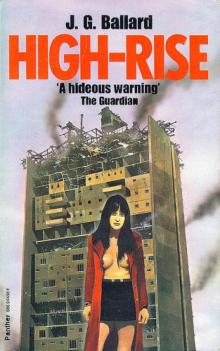- Home
- J. G. Ballard
High-Rise Page 2
High-Rise Read online
Page 2
As Laing stood on the balcony, accepting a drink from Charlotte, the noise of the party came down from the bright air, as if the sky itself had been wired for sound. Charlotte pointed to a fragment of glass on Laing's balcony that had escaped his brush.
"Are you under attack? I heard something fall." She called to Wilder, who was lounging back in the centre of her sofa, examining his heavy legs. "It's those people on the 31st floor."
"Which people?" Laing asked. He assumed that she was referring to a specific group, a clique of over-aggressive film actors or tax consultants, or perhaps a freak aggregation of dipsomaniacs. But Charlotte shrugged vaguely, as if it was unnecessary to be more specific.
Clearly some kind of demarcation had taken place in her mind, like his own facile identification of people by the floors on which they lived.
"By the way, what are we all celebrating?" he asked as they returned to the living-room.
"Don't you know?" Wilder gestured at the walls and ceiling. "Full house. We've achieved critical mass."
"Richard means that the last apartment has been occupied," Charlotte explained.
"Incidentally, the contractors promised us a free party when the thousandth apartment was sold."
"I'll be interested to see if they hold it," Wilder remarked. Clearly he enjoyed running down the high-rise. "The elusive Anthony Royal was supposed to provide the booze. You've met him, I think," he said to Laing. "The architect who designed our hanging paradise."
"We play squash together," Laing rejoined. Aware of the hint of challenge in Wilder's voice, he added, "Once a week -- I hardly know the man, but I like him."
Wilder sat forward, cradling his heavy head in his fists. Laing noticed that he was continually touching himself, for ever inspecting the hair on his massive calves, smelling the backs of his scarred hands, as if he had just discovered his own body. "You're favoured to have met him," Wilder said. "I'd like to know why. An isolated character -- I ought to resent him, but somehow I feel sorry for the man, hovering over us like some kind of fallen angel."
"He has a penthouse apartment," Laing commented. He had no wish to become involved in any tug of war over his brief friendship with Royal. He had met this well-to-do architect, a former member of the consortium which had designed the development project, during the final stages of Royal's recovery from a minor car accident. Laing had helped him to set up the complex callisthenics machine in the penthouse where Royal spent his time, the focus of a great deal of curiosity and attention. As everyone continually repeated, Royal lived "on top" of the building, as if in some kind of glamorous shack.
"Royal was the first person to move in here," Wilder informed him. "There's something about him I haven't put my finger on. Perhaps even a sense of guilt -- he hangs around up there as if he's waiting to be found out. I expected him to leave months ago. He has a rich young wife, so why stay on in this glorified tenement?" Before Laing could protest, Wilder pressed on. "I know Charlotte has reservations about life here -- the trouble with these places is that they're not designed for children. The only open space turns out to be someone else's car-park. By the way, doctor, I'm planning to do a television documentary about high-rises, a really hard look at the physical and psychological pressures of living in a huge condominium such as this one."
"You'll have a lot of material."
"Too much, as always. I wonder if Royal would take part -- you might ask him, doctor. As one of the architects of the block and its first tenant, his views would be interesting. Your own, too . . ."
As Wilder talked away rapidly, his words over-running the cigarette smoke coming from his mouth, Laing turned his attention to Charlotte. She was watching Wilder intently, nodding at each of his points. Laing liked her determination to stick up for herself and her small son, her evident sanity and good sense. His own marriage, to a fellow physician and specialist in tropical medicine, had been a brief but total disaster, a reflection of heaven-only-knew what needs. With unerring judgment Laing had involved himself with this highly strung and ambitious young doctor, for whom Laing's refusal to give up teaching -- in itself suspicious -- and involve himself directly in the political aspects of preventive medicine had provided a limitless opportunity for bickering and confrontation. After only six months together she had suddenly joined an international famine-relief organization and left on a three-year tour. But Laing had made no attempt to follow her. For reasons he could not yet explain, he had been reluctant to give up teaching, and the admittedly doubtful security of being with students who were still almost his own age.
Charlotte, he guessed, would understand this. In his mind Laing projected the possible course of an affair with her. The proximity and distance which the high-rise provided at the same time, .that neutral emotional background against which the most intriguing relationships might develop, had begun to interest him for its own sake. For some reason he found himself drawing back even within this still imaginary encounter, sensing that they were all far more involved with each other than they realized. An almost tangible network of rivalries and intrigues bound them together.
As he guessed, even this apparently casual meeting in Charlotte's apartment had been set up to test his attitude to the upper-level residents who were trying to exclude children from the 35th-floor swimming-pool.
"The terms of our leases guarantee us equal access to all facilities," Charlotte explained. "We've decided to set up a parents' action group."
"Doesn't that leave me out ?"
"We need a doctor on the committee. The paediatric argument would come much more forcefully from you, Robert."
"Well, perhaps . . ." Laing hesitated to commit himself. Before he knew it, he would be a character in a highly charged television documentary, or taking part in a sit-in outside the office of the building manager. Reluctant at this stage to be snared into an inter-floor wrangle, Laing stood up and excused himself. As he left, Charlotte had equipped herself with a checklist of grievances. Sitting beside Wilder, she began to tick off the complaints to be placed before the building manager, like a conscientious teacher preparing the syllabus for the next term.
When Laing returned to his apartment, the party on the 31st floor had ended. He stood on his balcony in the silence, enjoying the magnificent play of light across the neighbouring block four hundred yards away. The building had just been completed, and by coincidence the first tenants were arriving on the very morning that the last had moved into his own block. A furniture moving van was backing into the entrance to the freight elevator, and the carpets and stereo-speakers, dressing-tables and bedside lamps would soon be carried up the elevator shaft to form the elements of a private world.
Thinking of the rush of pleasure and excitement which the new tenants would feel as they gazed out for the first time from their aerial ledge on the cliff face, Laing contrasted it with the conversation he had just heard between Wilder and Charlotte Melville. However reluctantly, he now had to accept something he had been trying to repress -- that the previous six months had been a period of continuous bickering among his neighbours, of trivial disputes over the faulty elevators and air-conditioning, inexplicable electrical failures, noise, competition for parking space and, in short, that host of minor defects which the architects were supposed specifically to have designed out of these over-priced apartments. The underlying tensions among the residents were remarkably strong, damped down partly by the civilized tone of the building, and partly by the obvious need to make this huge apartment block a success.
Laing remembered a minor but unpleasant incident that had taken place the previous afternoon on the loth-floor shopping concourse. As he waited to cash a cheque at the bank an altercation was going on outside the doors of the swimming-pool. A group of children, still wet from the water, were backing away from the imposing figure of a cost-accountant from the 17th floor. Facing him in this unequal contest was Helen Wilder. Her husband's pugnacity had long since drained any self-confidence from her. Nervously trying to control
the children, she listened stoically to the accountant's reprimand, now and then making some weak retort.
Leaving the bank counter, Laing walked towards them, past the crowded check-out points of the supermarket and the lines of women under the driers in the hair-dressing salon. As he stood beside Mrs Wilder, waiting until she recognized him, he gathered that the accountant was complaining that her children, not for the first time, had been urinating in the pool.
Laing briefly interceded, but the accountant slammed away through the swing doors, confident that he had sufficiently intimidated Mrs Wilder to drive her brood of children away for ever.
"Thanks for taking my side -- Richard was supposed to be here." She picked a damp thread of hair out of her eyes. "It's becoming impossible -- we arrange set hours for the children but the adults come anyway." She took Laing's arm and squinted nervously across the crowded concourse.
"Do you mind walking me back to the elevator ? It must sound rather paranoid, but I'm becoming obsessed with the idea that one day we'll be physically attacked . . ." She shuddered under her damp towel as she propelled the children forward. "It's almost as if these aren't the people who really live here."
During the afternoon Laing found himself thinking of this last remark of Helen Wilder's.
Absurd though it sounded, the statement had a certain truth. Now and then his neighbours, the orthodontic surgeon and his wife, stepped on to their balcony and frowned at Laing, as if disapproving of the relaxed way in which he lay back in his reclining chair. Laing tried to visualize their life together, their hobbies, conversation, sexual acts. It was difficult to imagine any kind of domestic reality, as if the Steeles were a pair of secret agents unconvincingly trying to establish a marital role. By contrast, Wilder was real enough, but hardly belonged to the high-rise.
Laing lay back on his balcony, watching the dusk fall across the facades of the adjacent blocks. Their size appeared to vary according to the play of light over their surfaces. Sometimes, when he returned home in the evening from the medical school, he was convinced that the high-rise had managed to extend itself during the day. Lifted on its concrete legs, the forty-storey block appeared to be even higher, as if a group of off-duty construction workers from the television studios had casually added another floor. The five apartment buildings on the eastern perimeter of the mile-square project together formed a massive palisade that by dusk had already plunged the suburban streets behind them into darkness.
The high-rises seemed almost to challenge the sun itself -- Anthony Royal and the architects who had designed the complex could not have foreseen the drama of confrontation each morning between these concrete slabs and the rising sun. It was only fitting that the sun first appeared between the legs of the apartment blocks, raising itself over the horizon as if nervous of waking this line of giants. During the morning, from his office on the top floor of the medical school, Laing would watch their shadows swing across the parking-lots and empty plazas of the project, sluice-gates opening to admit the day. For all his reservations, Laing was the first to concede that these huge buildings had won their attempt to colonize the sky.
Soon after nine o'clock that evening, an electrical failure temporarily blacked out the 9th, 10th and 11th floors. Looking back on this episode, Laing was surprised by the degree of confusion during the fifteen minutes of the blackout. Some two hundred people were present on the 10th floor concourse, and many were injured in the stampede for the elevators and staircases. A number of absurd but unpleasant altercations broke out in the darkness between those who wanted to descend to their apartments on the lower levels and the residents from the upper floors who insisted on escaping upwards into the cooler heights of the building. During the blackout two of the twenty elevators were put out of action. The air-conditioning had been switched off, and a woman passenger trapped in an elevator between the 10th and nth floors became hysterical, possibly the victim of a minor sexual assault -- the restoration of light in due course revealed its crop of illicit liaisons flourishing in the benevolent conditions of total darkness like a voracious plant species.
Laing was on his way to the gymnasium when the power failed. Uneager to join the mêlée on the concourse, he waited in a deserted classroom of the junior school. Sitting alone at one of the children's miniature desks, surrounded by the dim outlines of their good-humoured drawings pinned to the walls, he listened to their parents scuffling and shouting in the elevator lobby. When the lights returned he walked out among the startled residents, and did his best to calm everyone down. He supervised the transfer of the hysterical woman passenger from the elevator to a lobby sofa. The heavy-boned wife of a jeweller on the 40th floor, she clung powerfully to Laing's arm, only releasing him when her husband appeared.
As the crowd of residents dispersed, their fingers punching the elevator destination buttons, Laing noticed that two children had sheltered during the blackout in another of the classrooms. They were standing now in the entrance to the swimming-pool, backing away defensively from the tall figure of the 17th-floor cost-accountant. This self-appointed guardian of the water held a long-handled pool skimmer like a bizarre weapon.
Angrily, Laing ran forward. But the children were not being driven from the pool. They stepped aside when Laing approached. The accountant stood by the water's edge, awkwardly reaching the skimmer across the calm surface. At the deep end three swimmers, who had been treading water during the entire blackout, were clambering over the side. One of them, he noticed without thinking, was Richard Wilder. Laing took the handle of the skimmer. As the children watched, he helped the accountant extend it across the water.
Floating in the centre of the pool was the drowned body of an Afghan hound.
2/Party Time
During these days after the drowning of the dog, the air of over-excitement within the high-rise gradually settled itself, but to Dr Laing this comparative calm was all the more ominous. The swimming-pool on the 10th floor remained deserted, partly, Laing assumed, because everyone felt that the water was contaminated by the dead Afghan. An almost palpable miasma hung over the slack water, as if the spirit of the drowned beast was gathering to itself all the forces of revenge and retribution present within the building.
On his way to the medical school a few mornings after the incident, Laing looked in at the 10th-floor concourse. After booking a squash court for his weekly game that evening with Anthony Royal, he walked towards the entrance of the swimming-pool. He remembered the panic and stampede during the blackout. By contrast, the shopping mall was now almost empty, a single customer ordering his wines at the liquor store. Laing pushed back the swing doors and strolled around the pool. The changing cubicles were closed, the curtains drawn across the shower stalls. The official attendant, a retired physical-training instructor, was absent from his booth behind the diving-boards. Evidently the profanation of his water had been too much for him.
Laing stood by the tiled verge at the deep end, under the unvarying fluorescent light. Now and then, the slight lateral movement of the building in the surrounding airstream sent a warning ripple across the flat surface of the water, as if in its pelagic deeps an immense creature was stirring in its sleep. He remembered helping the accountant to lift the Afghan from the water, and being surprised by its lightness. With its glamorous plumage drenched by the chlorinated water, the dog had lain like a large stoat on the coloured tiles. While they waited for the owner, a television actress on the 37th floor, to come down and collect the dog Laing examined it carefully. There were no external wounds or marks of restraint. Conceivably it had strayed from its apartment into a passing elevator and emerged on to the shopping concourse during the confusion of the power failure, fallen into the swimming-pool and died there of exhaustion. But the explanation hardly fitted the facts. The blackout had lasted little more than fifteen minutes, and a dog of this size was powerful enough to swim for hours. Besides, it could simply have stood on its hind legs in the shallow end. But if it had been thrown into the
pool, and held below the water in the darkness by a strong swimmer . . .
Surprised by his own suspicions, Laing made a second circuit of the pool. Something convinced him that the dog's drowning had been a provocative act, intended to invite further retaliation in its turn. The presence of the fifty or so dogs in the high-rise had long been a source of irritation. Almost all of them were owned by residents on the top ten floors -- just as, conversely, most of the fifty children lived in the lower ten. Together the dogs formed a set of over-pampered pedigree pets whose owners were not noticeably concerned for their fellow tenants'
comfort and privacy. The dogs barked around the car-parks when they were walked in the evening, fouling the pathways between the cars. On more than one occasion elevator doors were sprayed with urine. Laing had heard Helen Wilder complain that, rather than use their five high-speed elevators which carried them from a separate entrance lobby directly to the top floors, the dog-owners habitually transferred to the lower-level elevators, encouraging their pets to use them as lavatories.

 High-Rise
High-Rise The Drowned World
The Drowned World The Unlimited Dream Company
The Unlimited Dream Company Running Wild
Running Wild The Day of Creation
The Day of Creation The Wind From Nowhere
The Wind From Nowhere The Complete Short Stories, Volume 2
The Complete Short Stories, Volume 2 Concrete Island
Concrete Island Empire of the Sun
Empire of the Sun The Kindness of Women
The Kindness of Women Vermilion Sands
Vermilion Sands Super-Cannes
Super-Cannes Millennium People
Millennium People The Complete Stories of J. G. Ballard
The Complete Stories of J. G. Ballard Crash
Crash The Drought
The Drought The Atrocity Exhibition
The Atrocity Exhibition The Complete Short Stories: Volume 1
The Complete Short Stories: Volume 1 Miracles of Life: Shanghai to Shepperton: An Autobiography
Miracles of Life: Shanghai to Shepperton: An Autobiography Rushing to Paradise
Rushing to Paradise Chronopolis
Chronopolis Cocaine Nights
Cocaine Nights High Rise (1987)
High Rise (1987) The Complete Short Stories
The Complete Short Stories The Day of Creation (Harper Perennial Modern Classics)
The Day of Creation (Harper Perennial Modern Classics) The Crystal World
The Crystal World